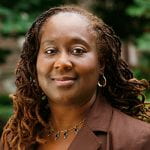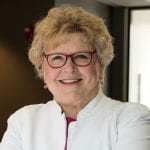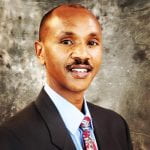Join the Center for Community Health Partnership & Research for the next installment of the Know Your Level of Community Engagement lecture series. This webinar will discuss why participating in community-engaged research is important and ways that both academic and community researchers can benefit from partnerships.

Vetta Sanders Thompson, PhD, will address why research partnerships between academics and community members are so vital. The discussion will include information about the benefits to both academia and to the community, note how community groups can apply the information learned through research to their own projects, and offer tips to advance scholarship when working in a community-academic partnership.
Following Dr. Sanders Thompson’s presentation, panelists will share examples of community-academic partnerships in action and offer practical advice. The webinar will end with an opportunity for audience Q&A.
At the conclusion of this webinar, attendees will be able to:
- Define the importance of community-engaged research to advancing community health and well-being
- Identify benefits to both academic and community partners engaging in research
- Understand how information learned from research could be applied to other community work
- Recognize ways to collaborate in various aspects of research, including publications
- Apply lessons from real community-academic work to their own work
This event is free to attend and open to all faculty, students, researchers, community members, and organizations interested in community-engaged research.
This event will take place on Zoom webinar. Please register to receive your unique link to attend. This session will be recorded and available for later viewing on our Vimeo channel.

Vetta Sanders Thompson, PhD
E. Desmond Lee Professor of Racial and Ethnic Diversity, Associate Dean for Diversity, Inclusion & Equity, Brown School
Co-Director, Center for Community Health Partnership & Research, Institute for Public Health
Washington University in St. Louis
Dr. Sanders Thompson is a leading researcher in the areas of racial identity, psychosocial implications of race and ethnicity in health communications, access to health services, and determinates of health and mental health disparities. She focuses on the importance of service to underserved populations through research, practice and community collaborations.

Carolyn M Baum, PhD, OTR, FAOTA
Professor of Occupational Therapy and Neurology
Washington University School of Medicine
Dr. Baum’s research focuses on enabling adults to live independently. Rather than focusing on people’s deficits, she seeks to understand what a person with chronic disease or disability can do. She has led the development of the Cognitive Rehabilitation Research group where the objective has been to link neuroscience to everyday life.

Geoffrey Soyiantet, MBA
Founder and Executive Director
Vitendo4Africa
Geoffrey Soyiantet is a Kenyan native and has served as a community organizer in the African immigrant community in St. Louis since 2007. His nonprofit Vitendo4Africa’s mission is to empower African immigrants through educational and outreach programs in Missouri. In Swahili, “Vitendo” means “action.” Vitendo4Africa exists to provide immigrant and refugee families with direct services and interconnected resources to improve their quality of life.
Know Your Level of Community Engagement is a lecture series presented by the Center for Community Health Partnership & Research at the Institute for Public Health and Institute of Clinical and Translational Sciences. The series is designed to introduce researchers and community members to the principles and practice of community-engaged research.
If you have any accessibility needs, please contact Emily Hickner at ehickner@wustl.edu. We need to be notified at least five business days prior to the event to guarantee accommodation for interpretation and CART (Communication Access Realtime Translation) services.